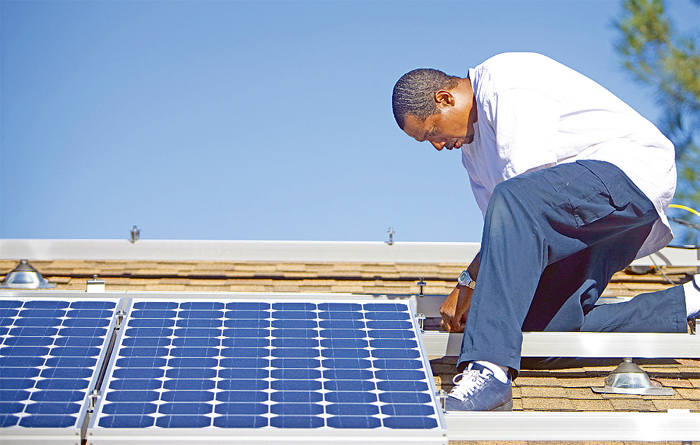Government looks to mini-grids to increase power access
Over the next fi ve years, the Government will prioritise the development of mini electric power grids, off grids and extension of the national grid to areas where it is nonexistent.
This, according to the energy minister, Eng. Mary Gorretti Kitutu, is intended to increase access to clean energy from the current 20% to well over 75%.
The Government resorted to the mini-grids due to the persistent low level of access, which was not supporting rural transformation fast enough, Kitutu said.
She said the small-scale renewable energy generation can provide the necessary supply to remote areas and also minimise the risk of overdependence on one source.
The minister was speaking during the Energy Week recently, where she launched Uganda's Energy Road Map in Kampala.
According to Benon Bena, the manager for Off-grid and Renewable Energy Development at the Rural Electrification Agency (REA), a study for at least 100 minigrids has been done.
"We have finished a study for about 100 mini-grids to be established across the country, co-funded by government, KfW and European Union. There is also a proposal for another 600 mini-grids," Bena revealed.
Majority of the mini-grids and off-grids will be on stand-alone settings due to the nature of settlements that are mainly sparsely populated, he said.
"One of the contentious and recurrent challenges that keep popping up in almost every discussion is the high cost of developing the mini-grids and the resultant tariff. That is why government is addressing it by providing grants and subsidies to the developers by meeting up to 70% of the project costs," Bena added.
The cost of electricity remains above the targeted five dollar cents per unit for all consumer categories. The categories include industries, households and street lighting.
HOW MINI-GRIDS WORK
Off-grid distributed generation is made of relatively smallscale generation capacities, connected to a distribution network (medium and low voltage) to provide clean, low cost and reliable energy. It would supply village homes and businesses with electricity similar to that on the national grid.

Moses Kakooza from GIZ noted that the private sector would be willing to embrace private investment for minigrids, but this is hampered by constraints in the policy and regulatory framework for mini-grids.
He said these need to be addressed to enable the private sector invest in minigrids and grow them to the necessary scale.
However, Bena said the Government is working on the issue of inter-connecting the grid with off-grid connections.
He said a pilot study is currently being done to test the interconnection issues that may arise.
Regulation allows interconnection of the minigrid to the main grid if the latter is extended to an area which is served by the former, he said.
Currently, there are 45 mini-grids being developed and funded by REA and development partners, such as the European Union and the German International Corporation (GIZ).
Eng. Kitutu concured and said so far, 13 mini-grids are operational, in addition to the 40 that are currently tendered for development.
"We have tendered out 40 mini-grids to be developed and operated by the private sector and they are estimated to provide 4,000 connections," she said.
Kitutu added that the Government is also eyeing other electric power solutions.
"The third alternative is isolated solar home systems and solar appliances. These provide valuable energy services in the form of lighting and power for electronics.
Government is providing credit support through solar loans, which are managed by commercial banks and micro finance institutions to enable households to acquire the systems," she added.
According to the energy ministry permanent secretary, Robert Kasande, the roadmap will be financed by government and development partners.
SOLAR MINI-GRID LICENCES
In 2017, GIZ Uganda, in partnership with the European Union, the Government of the Federal Republic of Germany and the Government of Uganda (represented by the Ministry of Energy and Minerals Development (MEMD), REA and the Electricity Regulatory Authority) launched an incentive-based programme for solar-powered mini-grids, dubbed "Promotion of Mini- Grids"— Pro Mini Grids.
Over 15 villages in the southwestern region and 25 sites in the northern Uganda were identified to be electrified under the Pro Mini- Grids pilot project.
Unlike in the past, where mini-grids were developed as unsolicited single village projects, Pro Mini-Grids are initiated through bundled tenders, hosted by the Government through REA to select strong project developers and operators.
So far, two developers have been identified and issued with licence exemption instruments to implement pilot projects that will provide electricity supply to 25 villages in the northern region (Lamwo district) and 15 villages in the south-western region (Isingiro and Rakai districts, according to the ministry).
One of the developers Winch Energy Ltd., has also signed the agreements with the Government, represented by the ministry and REA for the implementation of the 25 villages in Lamwo district.
Construction works have started with pole erection in both regions. The mini-grids are expected to be installed in 2021,according to the ministry officials.
WWF Uganda, with financing from the European Union and REA, is also implementing another six mini-grids in South Western Uganda (Kasese and Rubirizi districts).
Construction works for the distribution network and generation plant have started, with commissioning expected by March 2021. Once operational, the mini-grids are expected to supply power to at least 900 households and 205 businesses.
In partnership with UMEME, Power for All is implementing another three mini-grid pilot sites, which are expected to be commissioned next year.
Furthermore, the Germann Development Bank KfW has secured financing from the German Government and the European Union, and is preparing the Get Access project with a potential of 100 mini-grids to be tendered out next year following the Pro Mini-Grids approach.
The energy ministry, together with GIZ, have also started the process to prepare a funding proposal to the Green Climate Fund for the implementation of at least 600 mini-grids and, if successful, the project is expected to start in 2022.
Another 10-20 mini-grids are being set up through unsolicited private companies.